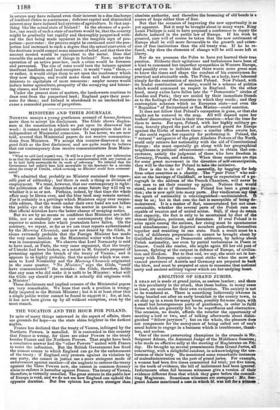MINISTERS AND THEIR JOURNALS.
NOTHING annoys a young gentleman accused of bonnesfrrtunes more than to accept his disclaimers. The Globe shows displea- sure at the construction which we put upon its disavowal last week : it cannot rest in patience under the supposition that it is independent of Ministerial connexion. It has never, we are now told, averred that Ministerial papers do not receive communica- tions from Ministers. We accept this counter-disavowal in as good faith as the first disclaimer, and are quite ready to believe that our contemporary does receive communications from Minis- ters— "i What we said (and repeat) was, 'It will be a piece of quite new information to us that the present Government is in such communication with any journal, as to be held fairly answerable for its mode of advocacy.' We inferred that the Government had unfairly been held answerable by the Spectator for a mistake about the treaty of Utrecht, which certainly no Minister could have communi- cated" We admitted that probably no Minister sustained the respon- sible pert of editorship; but there is such a thing as division of employment. We trust, however, that our contemporary is right: the publication of the despatches at some -future day will tell us whether it is so or not. Perhaps, indeed, by that time the whole affair may be blown over, and the blue book- may rennin unread. For it certainly is a privilege which Ministers enjoy over respon- sible editors, that the words under their own hand are not before the public eye at, the time when the matter in question is ; so that official mistakes have the better chance of escaping notice. But we are by no means so confident that Ministers are infal- lible, nor so modestly sure as our contemporary that they are superior to mistakes into which journalists have fallen. On the contrary, we repeat, so far as we can trust reports authenticated by the Morning Chronicle, and now not denied by the Globe, it seems extremely probable that the Foreign Minister has made the very same mistake as the Ministerial writer with whom he was in communication. We observe that Lord Normanby is said to have used, at Paris, the very same argument, that the treaty of Utrecht had been broken, as a retort to M. Guizot's proposal of protesting against the breach of the treaty of Vienna ; and it appears to us highly probable, that the mistake which was com- mon to Lord Normanby and the Morning Chronicle originated in the same quarter. "No Minister," says the Globe, 'could have communicated" the mistake : the Globe, therefore, holds that any man who did make it is unfit to be Minister : what will the Globe say should it prove that it actually did originate with a Minister?
These disclaimers and implied censure of the Ministerial papers are very remarkable. We hope that such a position is wrong- fully imputed to the British Minister,' but it is at least clear that a single public writer cannot be found to support it ; for, at last, it has now been given up by all without exception, even by the most stench.


























 Previous page
Previous page